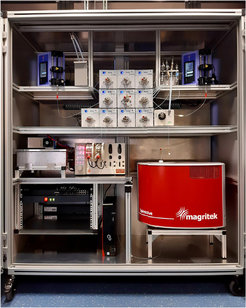Heading for automated drug synthesis
Research collaboration with Canada
On July 1st, 2022, Professor Peter H. Seeberger, Director at the Max Planck Institute of Colloids and Interfaces (MPICI) will welcome his chemist colleague Professor Andrei K. Yudin. Within the next six months, they will conduct joint research on the automated synthesis of highly active substances. Yudin is to receive this year's Konrad Adenauer Research Award.

Seeberger and Yudin are united by one goal: they want to bring their results from fundamental research to application and in this way develop specific active ingredients quickly, cost-effectively and automatically. Ideally, both have extensive experience in founding start-ups. "I am extremely excited about this collaboration; it could lead to important new technologies in healthcare," says Peter H. Seeberger, Director of the Department of Biomolecular Systems at the MPICI. Seeberger has already enabled the development of novel vaccines, therapies and diagnostics by developing complex sugar molecules using synthesis automation. Synthetic sugars, for example, are a component of vaccines against infectious diseases such as multi-resistant hospital germs.
Andrei K. Yudin, a Canada Research Chair in Medicine by Design at the University of Toronto, has already created a number of powerful tools for chemical synthesis within his research activities. One goal of his research is to develop new bioactive macrocycles that could be used to treat serious diseases. Yudin started Encycle Therapeutics in 2012 and established collaborations with Merck, GlaxoSmithKline, Pfizer, and AstraZeneca. In 2019, Encycle was acquired by Zealand Pharma, who have taken over the development of Encycle’s lead asset, ET3764, as an orally-delivered peptide drug to treat inflammatory bowel syndrome and Crohn’s disease. Despite these advances, the development of bioactive macrocycles continues to be extremely costly and time-consuming. "From the collaboration with the Max Planck Institute and Peter H. Seeberger, I expect to see a significant acceleration of both discovery and manufacturing processes. This will allow us to make bioactive agents for a wide range of applications," says Professor Andrei K. Yudin, adding, "I am looking forward to the collaboration and developing a long-term scientific exchange with the Seeberger lab."
About the research award
With the Konrad Adenauer Research Award, which is endowed with 60,000 euros, the Alexander von Humboldt Foundation recognizes the overall work of leading research personalities from Canada. In addition, the award winners are invited to carry out their self-selected research projects in Germany in collaboration with specialist colleagues. At the same time, the prize serves to strengthen scientific and cultural relations between Germany and Canada.












